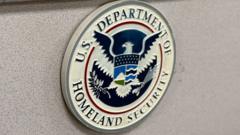**The U.S. government's decision to terminate Temporary Protected Status for Afghans and Cameroonians has sparked concerns over immigration policies and the fate of vulnerable communities.**
**Trump Administration Revokes Protected Status for Afghans and Cameroonians**

**Trump Administration Revokes Protected Status for Afghans and Cameroonians**
**Thousands Face Deportation As Temporary Protections End Amid Controversial Immigration Moves**
In a significant policy shift, the U.S. Department of Homeland Security (DHS) announced the termination of temporary deportation protections for approximately 14,600 Afghans and 7,900 Cameroonians. According to DHS assistant secretary Tricia McLaughlin, the U.S. Secretary of Homeland Security, Kristi Noem, assessed that conditions in both Afghanistan and Cameroon no longer warranted such protections.
The change will see Afghans losing their Temporary Protected Status (TPS) by May, while Cameroonians will see their protections lapse by June. This announcement coincided with a ruling by a U.S. judge permitting the Trump administration to deport a university graduate involved in pro-Palestinian demonstrations.
TPS is designed to aid nationals from countries experiencing unsafe conditions, such as armed conflict or natural disasters. For many migrants, it has provided a lifeline, allowing access to work permits and protection from deportation. Yet, earlier this month, it was revealed that the Taliban's return to power in Afghanistan and similar trends in Cameroon led Noem to conclude that these nations no longer met the criteria for TPS designation.
The revocation of protections aligns with other controversial immigration policies set forth by the Trump administration. This past month saw plans to rescind TPS for over half a million migrants from Cuba, Haiti, Nicaragua, and Venezuela—countries whose nationals were granted entry under a program initiated during the Biden administration. Those affected have been warned to prepare for their upcoming deportation deadlines.
Shukriah, an Afghan migrant and aspiring journalist, expressed her deep concerns following the notification from DHS to leave the U.S. She, along with her family, fled Afghanistan after the Taliban's resurgence, experiencing a harrowing journey of seeking asylum. Struggling with anxiety over their uncertain future, she worries about the impact of these policies on her family’s well-being.
The immigration stance has heightened scrutiny around Trump's administration's broader deportation strategy, including the recent wave of visa cancelations for international students involved in protests. Advocates continue to push back against these policies, emphasizing the need for a more compassionate approach towards immigrants and refugees.
Noem publicly embraced these actions, extolling the importance of the privilege associated with residing in the U.S. and condemning any association with pro-terror rhetoric. As legal battles ensue, many are left uncertain about their future in a changing political climate that increasingly complicates pathways to safety and stability for vulnerable populations.
The change will see Afghans losing their Temporary Protected Status (TPS) by May, while Cameroonians will see their protections lapse by June. This announcement coincided with a ruling by a U.S. judge permitting the Trump administration to deport a university graduate involved in pro-Palestinian demonstrations.
TPS is designed to aid nationals from countries experiencing unsafe conditions, such as armed conflict or natural disasters. For many migrants, it has provided a lifeline, allowing access to work permits and protection from deportation. Yet, earlier this month, it was revealed that the Taliban's return to power in Afghanistan and similar trends in Cameroon led Noem to conclude that these nations no longer met the criteria for TPS designation.
The revocation of protections aligns with other controversial immigration policies set forth by the Trump administration. This past month saw plans to rescind TPS for over half a million migrants from Cuba, Haiti, Nicaragua, and Venezuela—countries whose nationals were granted entry under a program initiated during the Biden administration. Those affected have been warned to prepare for their upcoming deportation deadlines.
Shukriah, an Afghan migrant and aspiring journalist, expressed her deep concerns following the notification from DHS to leave the U.S. She, along with her family, fled Afghanistan after the Taliban's resurgence, experiencing a harrowing journey of seeking asylum. Struggling with anxiety over their uncertain future, she worries about the impact of these policies on her family’s well-being.
The immigration stance has heightened scrutiny around Trump's administration's broader deportation strategy, including the recent wave of visa cancelations for international students involved in protests. Advocates continue to push back against these policies, emphasizing the need for a more compassionate approach towards immigrants and refugees.
Noem publicly embraced these actions, extolling the importance of the privilege associated with residing in the U.S. and condemning any association with pro-terror rhetoric. As legal battles ensue, many are left uncertain about their future in a changing political climate that increasingly complicates pathways to safety and stability for vulnerable populations.























